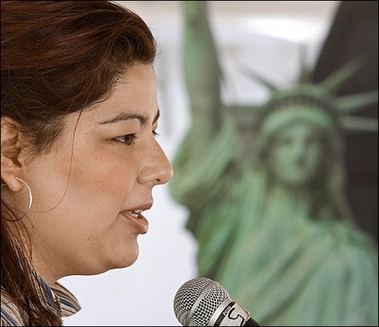Iran hints it will attend Baghdad talks
(AP)Updated: 2007-03-05 22:12
TEHRAN, Iran - Iran's foreign minister indicated Monday his country would take part in the international conference on Iraq on Saturday, which would be the first public US-Iranian encounter in nearly three years.
 Helga Aguayo, wife of AWOL US Army specialist Agustin Aguayo, a conscientious objector, delivers remarks on the status of her husband in Washington in 2006. [AFP]  |
Last week, the Iraqi government invited its neighboring states and the five permanent members of the U.N. Security Council to the conference. The United States quickly said it would attend, making a diplomatic shift after months of refusing to talk to Iran about calming the conflict in Iraq.
On Monday, the official Islamic Republic News Agency reported Mottaki as telling a press conference with the visiting Chadian foreign minister: "We are finishing our consideration of sending Iran's deputy foreign minister to the Baghdad conference."
The conference will be the first time that Iranian and US envoys have publicly come together since a meeting at an Egyptian Red Sea resort in late 2004 which was attended by then-US Secretary of State Colin Powell and his Iranian counterpart, Kamal Kharrazi.
Further, Mottaki said Iran was "not opposed" to ministerial-level meeting that has been proposed for later in the year, possibly in early April. Secretary of State Condoleezza Rice said last week that she would attend the later meeting.
However, Mottaki made clear that Iran did have reservations about Saturday's conference, saying participants "should aim to help the people and government of Iraq without decision-making from outsiders."
It is thought Iran fears that both Americans and Iraqis at the conference might accuse it of supporting Shiite armed groups in Iraq.
Washington's position on Iran has hardened in recent months. In December, the White House rejected the recommendation of the bipartisan Iraq Study Group that it reach out to Syria and Iran to try to stabilize Iraq.
President Bush has stepped up accusations that Iran is backing Shiite militants in Iraq. The US military has strengthened its presence in the Gulf and detained a number of Iranians in Iraq.
The United States is also leading a push for stronger sanctions against Iran over its defiance of U.N. Security Council demands that it stop enriching uranium, a process that provides material for nuclear reactors or atomic warheads.
|
||
|
||
|
|